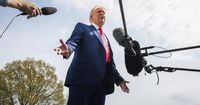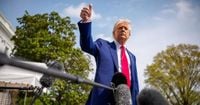In a dramatic turn of events following President Donald Trump's announcement of sweeping tariffs, financial markets experienced their steepest one-day declines since 2020, triggering widespread panic among consumers and analysts alike. On April 4, 2025, the Dow Jones Industrial Average plunged by 2,232 points, marking a staggering 5,000-point drop since Trump took office. This turmoil has led to fears of a recession, with some, like Senator Chuck Schumer, labeling it the "dumbest recession ever." Meanwhile, Trump’s response to the market chaos was a baffling all-caps post on his Truth Social platform: "ONLY THE WEAK WILL FAIL!"
As the markets reacted negatively to the increased tariffs, which hit a range of imports including agricultural products, many Americans began panic buying essentials, from televisions to soy sauce. The situation has been described by financial analysts as edging towards "economic Armageddon." Despite the turmoil, Trump, while spending the day golfing at his Mar-a-Lago resort, insisted via social media that the markets were actually set to "BOOM." This assertion stands in stark contrast to the reality unfolding on Wall Street.
Criticism of Trump's trade policies has come from various quarters, including Republican Senators Rand Paul and John Kennedy, who have voiced their concerns over the potential fallout of the tariffs. The tariffs, which include a 20 percent tax on Chinese imports, have prompted retaliatory measures from China, which announced a 34 percent tariff on American goods. This tit-for-tat escalation has left many economists worried about the long-term implications for the global economy.
In a bizarre twist, Trump shared a TikTok video on his platform that claimed he was intentionally crashing the stock market as part of a strategic move to lower interest rates. The video alleged that Warren Buffett had praised Trump’s economic strategy, stating he was making the best moves in over 50 years. However, Buffett's company, Berkshire Hathaway, quickly refuted these claims, labeling them as false. Buffett himself has been critical of tariffs in the past, describing them as "an act of war" and a tax on goods.
Despite the mounting evidence of economic distress, Trump remained defiant. He declared on Truth Social: "MY POLICIES WILL NEVER CHANGE," and emphasized that his economic strategy was already yielding results, pointing to a better-than-expected jobs report from March as evidence. However, many experts argue that the reality is far from Trump's optimistic portrayal.
Federal Reserve Chair Jerome Powell expressed concerns about the unpredictable trajectory of the economy, warning that the tariff increases would significantly exceed previous expectations and could lead to higher inflation and slower growth. This sentiment was echoed by Ngozi Okonjo-Iweala, director general of the World Trade Organization, who cautioned against a cycle of retaliatory measures that could further harm global trade.
As the situation unfolds, Trump’s administration has continued to downplay the negative projections from economists, framing them as ideologically driven critiques of his policies. However, the repercussions of the tariffs are already being felt across various sectors. For instance, California Governor Gavin Newsom announced plans to negotiate independent trade deals to protect local businesses affected by the tariffs.
In a further escalation, Japan announced it would face a 24 percent tariff on its exports to the United States, while Vietnam is set to experience a staggering 46 percent tariff on its exports beginning next week. These developments have prompted international leaders to scramble for solutions, with some urging the U.S. to reconsider its aggressive tariff strategy.
Trump's trade policies have sparked widespread debate, with supporters arguing that they are necessary to recalibrate unfair trade relationships and boost U.S. manufacturing. Detractors, however, warn that the long-term consequences could be dire, potentially leading to increased costs for consumers and a slowdown in economic growth.
As the financial markets continue to react to the uncertainty created by the tariffs, many are left wondering about the future of the U.S. economy. With the S&P 500 down nearly 6 percent and the tech-heavy Nasdaq falling into bear market territory, the stakes have never been higher. The question remains: will Trump's strategies yield the promised results, or are they setting the stage for a prolonged economic downturn?
In this tense atmosphere, the world watches closely as Trump’s administration navigates the complexities of international trade. The coming weeks will be crucial in determining not only the fate of the U.S. economy but also the stability of global markets.






